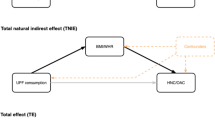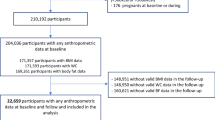Abstract
Previous studies of the association of meat intake and meat-derived mutagen exposure with breast cancer risk have produced inconsistent results. We evaluated this association in a population-based case–control study of incident breast cancer conducted in Nashville, Tennessee, United States, including 2,386 breast cancer cases and 1,703 healthy women controls. Telephone interviews were conducted to obtain information related to meat intake including amount, cooking methods, and doneness levels, as well as other known or hypothesized risk factors for breast cancer. Unconditional logistic regression was used to derive odds ratios (ORs) after adjusting for potential confounders. High intake of red meat was associated with a significantly elevated risk of breast cancer (P-trend < 0.001). The association was particularly strong for high intake of well-done red meat (P-trend < 0.001), with an adjusted OR of 1.5 (95% CI = 1.3–1.9) for the highest versus the lowest quartile. Associations between red meat and breast cancer risk were slightly stronger for postmenopausal women than for premenopausal women. Meat-derived mutagens such as 2-amino-3,8-dimethylimidazo[4,5-f]quinoxaline and 2-amino-3,4,8-trimethylimidazo[4,5-f]quinoxaline, were significantly associated with increased breast cancer risk among postmenopausal women only (P-trend = 0.002 and 0.003, respectively). The results from this study provide strong support for the hypotheses that high red meat intake and meat-derived mutagen exposure may be associated with an increase in breast cancer risk.
Similar content being viewed by others
References
Zheng W, Lee SA (2009) Well-done meat intake, heterocyclic amine exposure, and cancer risk. Nutr Cancer 61:437–446
Boyd NF, Stone J, Vogt KN, Connelly BS, Martin LJ, Minkin S (2003) Dietary fat and breast cancer risk revisited: a meta-analysis of the published literature. Br J Cancer 89:1672–1685
Missmer SA, Smith-Warner SA, Spiegelman D, Yaun S-S, Adami H-O, Beeson WL, van den Brandt PA, Fraser GE, Freudenheim JL, Goldbohm RA, Graham S, Kushi LH et al (2002) Meat and dairy food consumption and breast cancer: a pooled analysis of cohort studies. Int J Epidemiol 31:78–85
Cho E, Chen WY, Hunter DJ, Stampfer MJ, Colditz GA, Hankinson SE, Willett WC (2006) Red meat intake and risk of breast cancer among premenopausal women. Arch Intern Med 166:2253–2259
Steck SE, Gaudet MM, Eng SM, Britton JA, Teitelbaum SL, Neugut AI, Santella RM, Gammon MD (2007) Cooked meat and risk of breast cancer–lifetime versus recent dietary intake. Epidemiology 18:373–382
Taylor EF, Burley VJ, Greenwood DC, Cade JE (2007) Meat consumption and risk of breast cancer in the UK Women’s Cohort Study. Br J Cancer 96:1139–1146
Egeberg R, Olsen A, Autrup H, Christensen J, Stripp C, Tetens I, Overvad K, Tjonneland A (2008) Meat consumption, N-acetyl transferase 1 and 2 polymorphism and risk of breast cancer in Danish postmenopausal women. Eur J Cancer Prev 17:39–47
Hu J, La Vecchia C, DesMeules M, Negri E, Mery L, Canadian Cancer Registries Epidemiology Research Group (2008) Meat and fish consumption and cancer in Canada. Nutr Cancer 60:313–324
Linos E, Willett WC, Cho E, Colditz G, Frazier LA (2008) Red meat consumption during adolescence among premenopausal women and risk of breast cancer. Cancer Epidemiol Biomarkers Prev 17:2146–2151
Sonestedt E, Ericson U, Gullberg B, Skog K, Olsson H, Wirfalt E (2008) Do both heterocyclic amines and omega-6 polyunsaturated fatty acids contribute to the incidence of breast cancer in postmenopausal women of the Malmö diet and cancer cohort? Int J Cancer 123:1637–1643
Ferrucci LM, Cross AJ, Graubard BI, Brinton LA, McCarty CA, Ziegler RG, Ma X, Mayne ST, Sinha R (2009) Intake of meat, meat mutagens, and iron and the risk of breast cancer in the Prostate, Lung, Colorectal, and Ovarian Cancer Screening Trial. Br J Cancer 101:178–184
Kabat GC, Cross AJ, Park Y, Schatzkin A, Hollenbeck AR, Rohan TE, Sinha R (2009) Meat intake and meat preparation in relation to risk of postmenopausal breast cancer in the NIH-AARP diet and health study. Int J Cancer 124:2430–2435
Larsson SC, Bergkvist L, Wolk A (2009) Long-term meat intake and risk of breast cancer by oestrogen and progesterone receptor status in a cohort of Swedish women. Eur J Cancer 45:3042–3046
Mignone LI, Giovannucci E, Newcomb PA, Titus-Ernstoff L, Trentham-Dietz A, Hampton JM, Orav EJ, Willett WC, Egan KM (2009) Meat consumption, heterocyclic amines, NAT2, and the risk of breast cancer. Nutr Cancer 61:36–46
Pala V, Krogh V, Berrino F, Sieri S, Grioni S, Tjonneland A, Olsen A, Jakobsen MU, Overvad K, Clavel-Chapelon F, Boutron-Ruault M-C, Romieu I et al (2009) Meat, eggs, dairy products, and risk of breast cancer in the European Prospective Investigation into Cancer and Nutrition (EPIC) cohort. Am J Clin Nutr 90:602–612
Rabstein S, Bruning T, Harth V, Fischer HP, Haas S, Weiss T, Spickenheuer A, Pierl C, Justenhoven C, Illig T, Vollmert C, Baisch C et al (2009) N-acetyltransferase 2, exposure to aromatic and heterocyclic amines, and receptor-defined breast cancer. Eur J Cancer Prev 19:100–109
Wu K, Sinha R, Holmes MD, Giovannucci E, Willett W, Cho E (2010) Meat mutagens and breast cancer in postmenopausal women–a cohort analysis. Cancer Epidemiol Biomarkers Prev 19:1301–1310
Dai Q, Shu X-O, Jin F, Gao Y-T, Ruan Z-X, Zheng W (2002) Consumption of animal foods, cooking methods, and risk of breast cancer. Cancer Epidemiol Biomarkers Prev 11:801–808
Knize MG, Felton JS (2005) Formation and human risk of carcinogenic heterocyclic amines formed from natural precursors in meat. Nutr Rev 63:158–165
Felton JS, Knize MG, Wu RW, Colvin ME, Hatch FT, Malfatti MA (2007) Mutagenic potency of food-derived heterocyclic amines. Mutat Res 616:90–94
American College of Radiology (2003) Breast imaging reporting, data system: BI-RADS Atlas, 4th edn. American College of Radiology, Reston
Buchowski MS, Schlundt DG, Hargreaves MK, Hankin JH, Signorello LB, Blot WJ (2003) Development of a culturally sensitive food frequency questionnaire for use in the Southern Community Cohort Study. Cell Mol Biol (Noisy-le-grand) 49:1295–1304
Shin A, Shrubsole MJ, Ness RM, Wu H, Sinha R, Smalley WE, Shyr Y, Zheng W (2007) Meat and meat-mutagen intake, doneness preference and the risk of colorectal polyps: the Tennessee Colorectal Polyp Study. Int J Cancer 121:136–142
Sinha R, Cross A, Curtin J, Zimmerman T, McNutt S, Risch A, Holden J (2005) Development of a food frequency questionnaire module and databases for compounds in cooked and processed meats. Mol Nutr Food Res 49:648–655
Zheng W, Gustafson D, Sinha R, Cerhan J, Moore D, Hong C, Anderson K, Kushi L, Sellers T, Folsom A (1998) Well-done meat intake and the risk of breast cancer. J Natl Cancer Inst 90:1724–1729
Madure M, Greenland S (1992) Tests for trend and dose response: misinterpretations and alternatives. Am J Epidemiol 135:96–104
De Stefani E, Ronco A, Mendilaharsu M, Guidobono M, Deneo-Pellegrini H (1997) Meat intake, heterocyclic amines, and risk of breast cancer: a case–control study in Uruguay. Cancer Epidemiol Biomarkers Prev 6:573–581
Gertig DM, Hankinson SE, Hough H, Spiegelman D, Colditz GA, Willett WC, Kelsey KT, Hunter DJ (1999) N-acetyl transferase 2 genotypes, meat intake and breast cancer risk. Int J Cancer 80:13–17
Delfino RJ, Sinha R, Smith C, West J, White E, Lin HJ, Liao S-Y, Gim JSY, Ma HL, Butler J, Anton-Culver H (2000) Breast cancer, heterocyclic aromatic amines from meat and N-acetyltransferase 2 genotype. Carcinogenesis 21:607–615
Rohrmann S, Lukas Jung S-U, Linseisen J, Pfau W (2009) Dietary intake of meat and meat-derived heterocyclic aromatic amines and their correlation with DNA adducts in female breast tissue. Mutagenesis 24:127–132
Layton DW, Bogen KT, Knize MG, Hatch FT, Johnson VM, Felton JS (1995) Cancer risk of heterocyclic amines in cooked foods: an analysis and implications for research. Carcinogenesis 16:39–52
Augustsson K, Skog K, Jagerstad M, Steineck G (1997) Assessment of the human exposure to heterocyclic amines. Carcinogenesis 18:1931–1935
Zimmerli B, Rhyn P, Zoller O, Schlatter J (2001) Occurrence of heterocyclic aromatic amines in the Swiss diet: analytical method, exposure estimation and risk assessment. Food Addit Contam Part A Chem Anal Control Expo Risk Assess 18:533–551
Ronco AL, De Stefani E, Fabra A (2003) White meat intake and the risk of breast cancer: a case-control study in Montevideo, Uruguay. Nutr Res 23:151–162
Sinha R (2002) An epidemiologic approach to studying heterocyclic amines. Mutat Res 506–507:197–204
Moorman PG, Newman B, Millikan RC, Tse C-KJ, Sandler DP (1999) Participation rates in a case-control study: the impact of age, race, and race of interviewer. Ann Epidemiol 9:188–195
Teschke K, Marino S, Chu R, Tsui JK, Harris MA, Marion SA (2010) Public opinions about participating in health research. Can J Public Health 101:159–164
Norat T, Lukanova A, Ferrari P, Riboli E (2002) Meat consumption and colorectal cancer risk: dose-response meta-analysis of epidemiological studies. Int J Cancer 98:241–256
Hu FB, Stampfer MJ, Manson JE, Ascherio A, Colditz GA, Speizer FE, Hennekens CH, Willett WC (1999) Dietary saturated fats and their food sources in relation to the risk of coronary heart disease in women. Am J Clin Nutr 70:1001–1008
Fung TT, Schulze M, Manson JE, Willett WC, Hu FB (2004) Dietary patterns, meat intake, and the risk of type 2 diabetes in women. Arch Intern Med 164:2235–2240
Acknowledgments
This work was supported by research grant (R01CA100374) from the US National Cancer Institute. The authors would like to thank the study participants and research staff of The Nashville Breast Health Study (NBHS) for their support of this research, Dr. Rashmi Sinha for providing food photos to assess meat doneness levels, and Mary Jo Daly for technical assistance in the preparation of this manuscript. Survey for this study was conducted by the Biospecimen and Survey Shared Resource, which is supported in part by P30CA68485.
Conflicts of interest
None of the authors declare any conflicts of interest.
Author information
Authors and Affiliations
Corresponding author
Rights and permissions
About this article
Cite this article
Fu, Z., Deming, S.L., Fair, A.M. et al. Well-done meat intake and meat-derived mutagen exposures in relation to breast cancer risk: the Nashville Breast Health Study. Breast Cancer Res Treat 129, 919–928 (2011). https://doi.org/10.1007/s10549-011-1538-7
Received:
Accepted:
Published:
Issue Date:
DOI: https://doi.org/10.1007/s10549-011-1538-7




